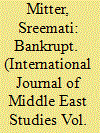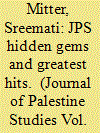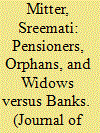|
|
|
Sort Order |
|
|
|
Items / Page
|
|
|
|
|
|
|
| Srl | Item |
| 1 |
ID:
172453


|
|
|
|
|
| Summary/Abstract |
In the late 1930s, the first independent Arab banks in Palestine, the Arab Bank and the Arab Agricultural Bank, sued customers who had defaulted on loans in an attempt to maintain solvency. Their indebted customers, unable to pay, fought back to prevent their lands from being foreclosed and sold to Zionist buyers. Each party claimed that its position was consistent with, indeed essential to, the anti-Zionist nationalist cause. The story of these pioneering Arab banks and their legal battles with their customers in the wake of the 1936-1939 revolt provides insight into Arab financial life in Mandate Palestine. It reveals the banks’ struggles to survive; complicates notions of Arab-Palestinian landlessness and indebtedness; and argues that political and economic exigencies, not reductive notions of collaboration or patriotism, produced the banks’ antagonistic relationship with their customers, whereby the survival of one came at the expense of the other.
|
|
|
|
|
|
|
|
|
|
|
|
|
|
|
|
| 2 |
ID:
178798


|
|
|
|
|
| Summary/Abstract |
In addition to selecting a “greatest hit” and a “hidden gem,” here, Sreemati Mitter provides readers with a broad overview of Journal of Palestine Studies (JPS) content on the topic of capitalism in Palestine. Mitter singles out Alexander Schölch’s classic, “The Economic Development of Palestine, 1856–1882” (1981) as a greatest hit and Peter Lagerquist’s haunting “Vacation from History: Ethnic Cleansing as the Club Med Experience” (2006) as a hidden gem. Read together, she argues, these two pieces help elucidate how powerful forces of global market capitalism converged on Palestine’s storied Mediterranean coast to shape its economy in the modern period.
|
|
|
|
|
|
|
|
|
|
|
|
|
|
|
|
| 3 |
ID:
180231


|
|
|
|
|
| Summary/Abstract |
This essay attempts to rectify the silence about the willful expropriation, by British and Israeli forces, of private Palestinian financial assets. Placing at its core the stories of ordinary Palestinians, it explores how they were robbed of their bank accounts, bonds, stocks, pensions, salaries, and safety deposit boxes during the creation and termination of the Palestine Mandate (in both 1917 and 1948). The essay argues that the basic financial structure of colonization, which deprives the colonized of the protection of sovereign banking institutions, facilitated these thefts. It also argues that the supposedly neutral rules of finance acted as a fig leaf to such dispossessions. Based on archival research and oral histories, it presents a new social history of finance that centers the experiences and subjectivities of non-elite Palestinians who strove to defend themselves and assert their rights, individually and collectively, during pivotal moments of violent upheaval and rupture.
|
|
|
|
|
|
|
|
|
|
|
|
|
|
|
|
|
|
|
|
|